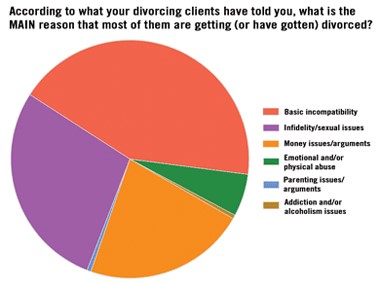Survey: CDFA Professionals Reveal the Leading Causes of Divorce
By IDFA On 08/29/2013
According to a recent survey of 191 CDFA professionals from across North America, the three leading causes of divorce are "basic incompatibility" (43%), "infidelity" (28%), and "money issues" (22%). "Emotional and/or physical abuse" lagged far behind (5.8%), and "parenting issues/arguments" and "addiction and/or alcoholism issues" received only .5% each.

According to a recent survey of 191 CDFA® professionals from across North America, the three leading causes of divorce are "basic incompatibility" (43%), "infidelity" (28%), and "money issues" (22%). "Emotional and/or physical abuse" lagged far behind (5.8%), and "parenting issues/arguments" and "addiction and/or alcoholism issues" received only .5% each. From August 1 to 29, 2013, 191 CDFA professionals from across North America responded to the question: "According to what your divorcing clients have told you, what is the main reason that most of them are getting (or have gotten) divorced?"
“Many couples lack the communication skills necessary to navigate financial disagreements in their marriage,” noted one respondent. “The emotional connection of money with safety and security in many people makes the financial disagreements more salient than other disagreements.”
“The incompatibility is usually caused by one or more of the other choices,” another CDFA professional added. Several of the CDFA professionals surveyed noted that the most commonly cited cause of divorce they hear from their clients—“basic incompatibility”—is usually created by deeper issues somewhere in the relationship—usually an emotional, physical, or financial breach of trust. This may help to explain the difference in findings between this survey and the findings of a 2012 academic study. “Examining the Relationship between Financial Issues and Divorce,” published in the Family Relations journal (v. 61, No. 4, Oct. 2012), looked at data for 4,574 couples as part of the U.S.-based “National Survey of Families and Households”. In the study, researchers Jeffrey Dew, Sonya Britt, and Sandra Huston examined data related to what couples argue about—including children, money, in-laws, and spending time together—and then looked at which of those couples were divorced four to five years later. According to the study, financial disagreements were the strongest disagreement types to predict divorce for both men and women.
In a poll conducted by Divorce Magazine, the leading cause of divorce was found to be financial issues, followed closely by basic incompatibility. “During the divorce, the two most contentious issues are usually finances and children—in that order,” says Dan Couvrette, publisher of Divorce Magazine. “If there are no children, then basic incompatibility and communication problems follow on the heels of money problems.”
“I have long believed financial disagreements to be the most common cause of marital conflict and ultimately divorce,” says Justin A. Reckers, a CDFA professional based in Dan Diego, CA. “Now we have empirical evidence proving this is the case across all socio-economic classes.” Disparate goals and values around money coupled with the power and control financial prosperity represents makes money a common battle ground in marriages, Reckers adds. During their divorce, a couple may be playing out the same financial conflicts they had during their marriage. “Research is telling us to be cautious because these financial disagreements may have been the building blocks for the conflict that ended their marriage in the first place,” Reckers points out. As a CDFA professional, he helps couples to “realize their financial conflicts are usually just difficult decision-making processes set against the back-drop of competing goals and values. When clients realize this, the conflict becomes manageable and cases settle,” Reckers concludes. If marriage is all about love, then divorce is all about money. “And when people are going through a divorce, they must keep their focus on the money,” says Jeffrey A. Landers, a CDFA professional based in New York, NY. The author of Divorce: Think Financially, Not Emotionally (Sourced Media Books, 2012), Landers adds that divorces are now much more financially complicated than they were just ten or 15 years ago. “Today, it’s not unusual for marital assets to include residential and commercial real estate, sophisticated financial investments, complex employee compensation packages, and closely-held businesses or professional practices,” he says. “Finances, financial projections and analyses aren’t taught in law school—and good divorce lawyers understand they don’t have the expertise and/or the time to handle the financial complexities of their clients’ cases.” This means that more and more divorce lawyers are now encouraging their clients to hire a skilled CDFA professional to assist in their case. “If a divorcing person hopes to lock in a secure financial future for themselves and their children, then it is vitally important to have a divorce financial advisor on their team,” asserts Landers. “And not just any financial advisor: they need one with the training and experience to handle their specific set of circumstances.”
NOT LEGAL OR TAX ADVICE: This information is for general informational purposes only and does not constitute legal advice or tax advice. It is not intended to be a substitute for professional legal or tax advice. You should seek the advice of a qualified attorney or tax professional for advice, support, and/or services tailored to your specific facts and circumstances. This communication does not create an attorney-client relationship, nor is it a solicitation to offer legal advice. IDFA and its representatives make no warranties about the information contained herein and assumes no responsibility for errors or omissions in the content or for any actions taken based on the information provided.
IRS CIRCULAR 230 NOTICE: To ensure compliance with the requirements of IRS Circular 230, we inform you that any U.S. tax advice contained in this communication or any of our materials is not intended or written to be used and cannot be used for the purpose of avoiding penalties under the Internal Revenue Code or for promoting, marketing or recommending to another party any transaction or matter addressed in this communication or attachment.

 800.875.1760
800.875.1760










